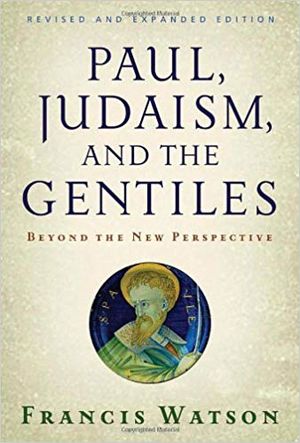Paul, Judaism, and the Gentiles: Beyond the New Perspective (2007 Watson), book (rev. ed.)
Paul, Judaism, and the Gentiles: Beyond the New Perspective (2007) is the revised edition of Paul, Judaism and the Gentiles: A Sociological Approach (1986 Watson), book.
Abstract
"In this new, completely rewritten edition of his major 1986 book, Francis Watson extends, updates, and clarifies his response to E.P. Sanders's view of Paul, in order to point the way beyond the polarization of "new" and "old" perspectives on the apostle. The Paul who comes to light in these pages is agent and thinker, apostle and theologian. He is a highly contextual figure, yet his account of Christian identity continues to shape the church's life to this day. He is the founder of mainly Gentile, Christ-believing communities, separated from the synagogue; and yet he can see this distinctive existence as an authentic response to Jewish scripture and tradition, as fulfilled in Christ. He is a many-sided figure, transcending all our attempts to categorize him or to co-opt him for our own favored causes."--Publisher description.
Editions
Published in Grand Rapids, MI: Eerdmans, 2007.
Contents
Retrospective -- Divergences -- Paul, the Reformation, and modern scholarship -- The Lutheran reading of Paul -- Opposition to the Lutheran reading -- A sociological approach -- Jewish law and Gentile mission -- The origins of Paul's view of the law -- The evidence of Acts -- The Cornelius episode -- The origins of the Antiochene Church -- The evidence of Paul's letters -- A mission to the diaspora -- Gentile circumcision and the diaspora synagogue -- Jewish rejection and Gentile mission -- Freedom and alienation -- Two sociological models -- Qumran -- The Johannine community -- Paul -- The Galatian crisis -- The origins of the crisis-- Mission to Gentiles : early debates -- From the Jerusalem council to the Antioch incident -- The founding of the Galatian churches -- Agitation in Galatia -- Paul's response to the crisis -- Denunciation -- Antithesis -- Reinterpretation -- Philippi, Corinth and the Jewish Christian Mssion -- Philippians 3 : a postscript to Galatians -- Place and time of writing -- Denunciation -- Antithesis -- "Judaizers" at Corinth? -- Jewish Christianity in 1 Corinthians? -- Paul's opponents in 2 Corinthians 10:13 -- 2 Corinthians 3 as evidence for "judaizers"? -- Jews, Gentiles, and Romans -- Rome in Pauline perspective -- The question of the purpose of Romans -- The origins of Roman Christianity -- A divided community (Romans 14:1-15:13) -- Gentiles and Jews in Rome (Romans 16) -- The evidence of Romans 1:1-17 and 15:14-33 -- The social function of Romans 2 -- A sociological approach to Romans 1:11 -- Romans 2 : denunciation -- Critique of the Jewish view of the covenant -- The obedient Gentiles -- Pauline antithesis and its social correlate (Romans 3) -- The textuality of the law (Romans 3:1-20)-- Jews, Gentiles, and faith (Romans 3:21-31) -- Secondary comparisons (Romans 3:27-31) -- The law and Christian identity (Romans 4-8) -- Reinterpreting Abraham (Romans 4) -- Grace and works -- A symbol of unity -- Christ, hope, and reconciliation (Romans 5) -- The social significance of hope -- The universal Christ -- Grace, law, and sin (Romans 67) -- Two communal identities -- The genesis of sin -- Law and spirit (Romans 7-8) -- "To those under law as one under law ..." -- A conflict of jurisdictions -- Rehabilitating the law -- Election : reimagining the scriptural witness (Romans 9-11) - Orientation (Romans 9:1-5) -- The pattern of election (Romans 9:6-29) -- The dynamics of election (Romans 9:30-10:21) -- The scriptural hope (Romans 11:1-36).
